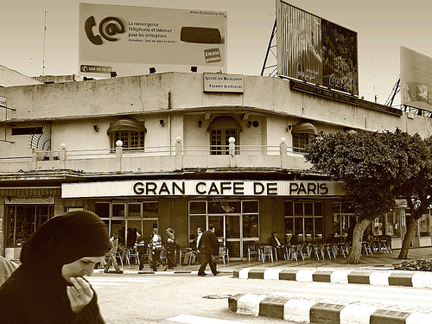
by Anouar Majid, Tingis Redux, March 16, 2011
Many years ago, while sitting with a friend in a café in the Moroccan city of Tangier, I expressed my unfailing admiration for Mohamed Choukri, author of the acclaimed memoir For Bread Alone (al-khubz al-hafi) and its sequel Streetwise (the somewhat inexplicale translation of what should have been The Time of Error, or zamanu al-akhta’). I told my friend, a Ministry of Justice official on his way up to a judgeship, that what I liked most about Choukri was his literary courage (al jur’a al-adabiya). My friend, a conservative man with a classical education in Islamic Studies, dismissed such courage as mere silliness, the ranting of a down-and-out man seeking attention and literary fame. Our society, my friend pronounced, was light years away from appreciating such openness and candor. We trade in appearances, not in existential truths. We reward conformity and punish daring acts of individualism.
Things have changed since then, and Choukri is now universally acclaimed across Morocco and much of the Arab world. The die-hard Tangerian is long gone, too, as is my friend, who, one day, collapsed in Fez and never got up. Yet I now find myself asking the same question about the mesmerizing memoir of a Moroccan woman that kept me engrossed for two days straight. The more I read into Wafa Faith Hallam’s The Road from Morocco, the more I realized I was holding a book that—if all literary lights are not dimmed by convention—should become an instant classic.
I honestly cannot recall a time when an autobiographical account has spoken to me as forcefully as Hallam’s memoir. In fact, I never ever read anything remotely comparable to it. Hallam’s trailblazing book shatters literary and social conventions with such force that it is bound to provoke strong reactions. The book contains precious lessons about why freedom and equal rights matter, why the male oppression of women in Arab and Muslim societies is a sad farce, why rich life experiences are still the only reliable ingredient for a soaring story, and why identity is a complex construct that is nearly impossible to tease apart. There is more—way more—in this fast-moving and intense account, but I’ll return to some of these issues after I provide a sense of the plot.
The life of Wafa, now a vivacious fifty-four year old woman living in the state of New York, begins in the sedate Moroccan city of Meknes, where her mother, thirteen-year old Saadia, is given to a thirty-three year old man in marriage against her will. The union is doomed from the start. Although she loathes her husband, Saadia gets pregnant and, in short order, gives birth to four children—two girls (Wafa and Nezha) and two boys (Abdu and Larbi, the surviving half of twins). Because some of these pregnancies are so traumatic, and because she has no meaningful relationship with her husband, Saadia undergoes an abortion every time she gets pregnant. (The contraceptive pill was not yet available in Morocco.) Meanwhile, the oblivious husband and father, a government employee without ambition, continues to spend his time with friends in cafés, bars, and mosques, doing very little to help his growing family.
for the rest of this story, click here and go to Tingis Redux